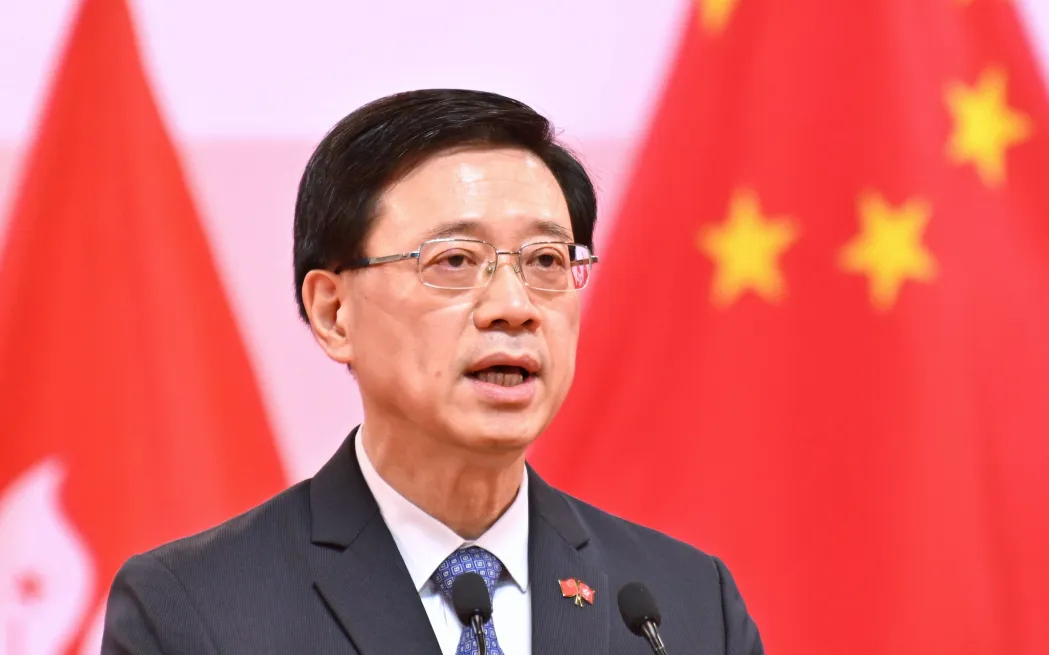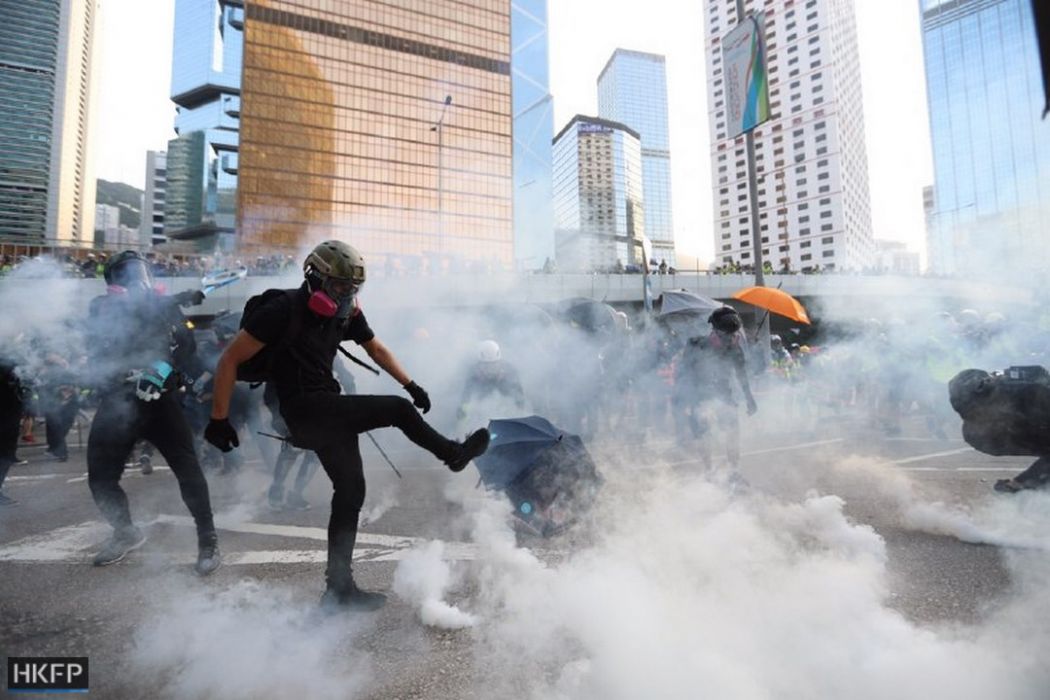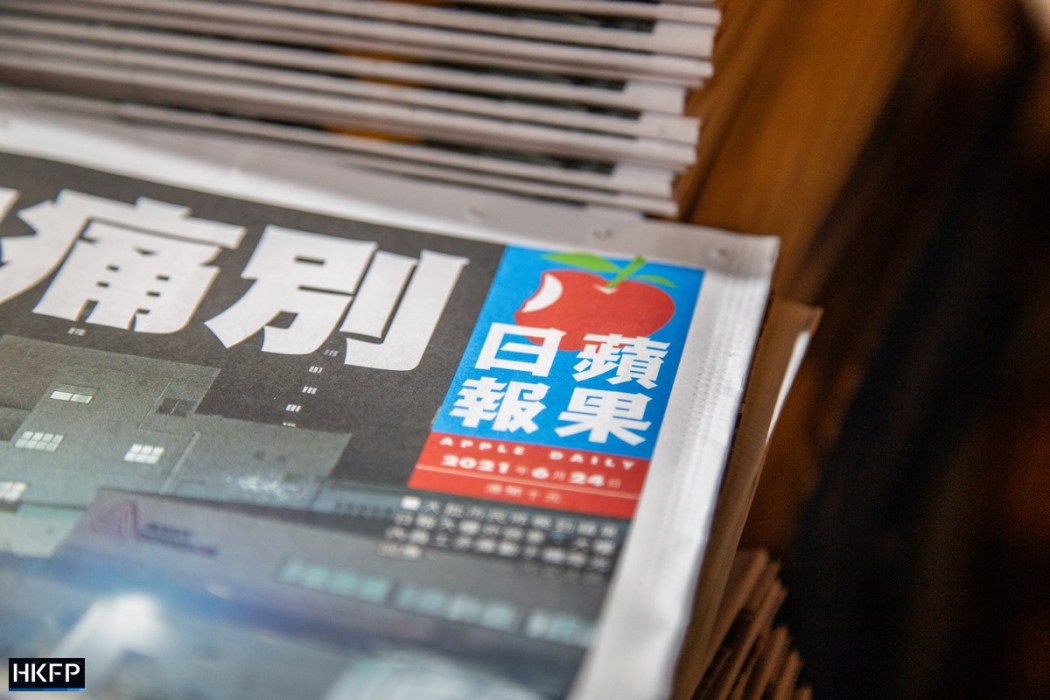Hong Kong’s former chief secretary John Lee has officially thrown his hat into the ring for next month’s leadership race after he submitted 786 nominations on Wednesday. The 64-year-old is the sole hopeful in the small-circle election scheduled for May 8. Lee is on track to be elected the next chief executive by the 1,462 Election Committee members he vetted last year.

Lee’s appointment by 0.02 per cent of the population will mark the first time a former police officer from the security branch of the government rises to the top job in post-colonial Hong Kong. Known for his hardline approach since he took the helm of the Security Bureau in September 2017, Lee’s tenure saw the 2019 protests and the subsequent enactment of the Beijing-imposed national security law.
He gained an unprecedented promotion last June to the second-highest role in the administration, where he was entrusted to chair a powerful committee to ensure election candidates were Chinese patriots.
The role paved the way for him to become “Beijing’s man.” But who is John Lee? HKFP rounds up key quotes from the expected incoming leader of Hong Kong, and explains why they matter.
On the 2019 extradition bill
As then-security chief, Lee played a pivotal role in pushing for the ill-fated extradition bill in 2019, which sparked the city’s worst political and social turmoil in decades. He stood firm on passing the controversial proposal that would have allowed fugitives to be handed over to mainland Chinese authorities, despite criticism that a fair trial might not be guaranteed under China’s opaque legal system, and concerns that the arrangement might be used to stifle dissent.

In April that year, he vowed to press on with the legislative amendment even if murder suspect Chan Tong-kai – whose case prompted the bill – might walk free. The current system contained “loopholes” that the government must “plug,” he said.
“We have been an ostrich for 22 years.”
john lee, may 8, 2019, speaking in chinese.
The government’s resolution to put forward the extradition bill resulted in large-scale demonstrations and protests two months later, when more than one million Hongkongers – according to organisers’ estimate – took to the streets on June 9 to demand the “evil law” be scrapped.

The bill was suspended days after tens of thousands of protesters surrounded the government headquarters in Admiralty to delay the legislative debate. But Chief Executive Carrie Lam’s refusal to withdraw the proposed amendment triggered another mass demonstration on June 16, this time with an approximate turnout of nearly two million.
The historic march prompted Lam and Lee to apologise to the public for mishandling the bill. He pledged to “listen to opinions broadly” before pushing for a policy in the future.
“We admit there were deficiencies in our work promoting the amendment bill. It triggered social conflicts, disputes and anxieties. We apologise for this.”
john lee, june 29, 2019, speaking in chinese.
The apologies from top officials did little to assuage public discontent, however, and citywide unrest continued to rock Hong Kong for months. Once-peaceful demonstrations escalated into violent clashes with the police, while the demands of protesters morphed into wider calls for democracy.

The police force faced allegations of misconduct, as the public criticised its use of tear gas cannisters, water cannon trucks, rubber bullets, bean bag rounds and live rounds to quell the protests. Meanwhile, demonstrators blocked roads, hurled bricks and petrol bombs and vandalised shops.
In response to accusations that frontline police had failed to display their warrant cards, making it difficult for people to file complaints against the force, Lee told lawmakers at the time that officers had no space on their uniforms to display their credentials. He also urged citizens not to “vent” their discontent with the government against the force.
“The design of the uniform leaves no space for displaying the police officer’s number.”
john LEE, JUNE 19, 2019, speaking in chinese.
Almost three months into the unprecedented turmoil, Hong Kong leader Lam announced she would formally axe the legislation. Lee retracted the bill on behalf of the government on October 23, but did not give a direct response when asked by lawmakers whether he would step down.

As the unrest continued to unfold, Lee and other top officials toughened their interpretation of the protests, issuing strongly-worded condemnations and characterising the 2019 movement as citywide “riots” and “black violence.”
On national security
Like other Hong Kong officials, Lee threw his weight behind the sweeping security law that came into effect on June 30, 2020. He hailed the legislation which targets secession, subversion, collusion with foreign forces and terrorist acts as placing the city’s “chaos under control” and bringing back Hong Kong’s overall security.

The police force won sweeping authority to intercept communications, require internet service providers to take down information, as well as search and seize journalistic materials. In an interview with Sing Tao in July 2020, Lee said the powers were “appropriate.”
In his first blog post as chief secretary dated July 3, 2021, Lee gave his word that the government would adopt an “all-out effort” to combat what he described as local terrorism. Citing the “lone-wolf attack” on a police officer during the city’s handover anniversary, the official warned that tributes to the suspect who committed suicide amounted to glorifying and encouraging an act of terror. It was how “domestic terrorism” often emerged, Lee claimed, adding often it could also stem from “the incitement of hatred, discord and division.”
“The violent riots that had taken place in Hong Kong since June 2019… had the more profound consequences of ruining people’s law-abidingness and breeding homegrown terrorism.”
john lee, july 3, 2021.
The then-chief secretary also commented on Hong Kong’s first-ever national security trial, where defendant Tong Ying-kit was jailed for nine years for inciting secession and engaging in terrorist acts. Lee said the sentence had to be deterrent enough to caution the public from breaking the law.
“[I]f anyone tries to challenge the Hong Kong National Security Law… it is tantamount to playing with fire and [they] will pay a heavy price…”
JOhn lee, july 31, 2021, speaking in chinese.
On Apple Daily and Stand News
In his final days as the head of the Security Bureau, Lee froze HK$18 million worth assets of pro-democracy newspaper Apple Daily, after national security police arrested several senior executives and raided the newsroom for the second time in June last year. The move forced the 26-year-old tabloid to shutter and print its last-ever edition a week after the arrests.

The swift demise of Apple Daily dealt a “chilling blow” to the city’s press freedom, critics said, but Lee insisted the case had nothing to do with “normal journalistic work.” He told other members of the press to “keep their distance” from Apple Daily, adding the government would crack down on national security crimes with stringent laws.
“Ordinary journalists are different from them… [for] anyone who tries to use journalistic work as a shield to engage in crimes endangering national security, the SAR government must use the strictest measures to clamp down [on them]. “
john lee, june 17, 2021, speaking in chinese.
Lee made similar remarks when the government cracked down on a second news outlet that had a pro-democracy slant in December last year. Seven people linked to digital outlet Stand News were apprehended on suspicion of breaching the colonial-era sedition law, with two former top editors later charged with conspiring to publish seditious publications.
The independent outlet shut down on the same day of the arrests and police raid, deleting all of its content. Assets totalling HK$61 million were also frozen by the authorities.

Speaking as the chief secretary, Lee at the time called on journalists to distance themselves from “evil elements” who “damaged press freedom.”
“Professional media workers should recognise that these are the bad apples who are abusing their position simply by wearing a false coat of media worker… they will pollute press freedom.”
John Lee, December 29, 2019.
On US sanctions
Lee was among 11 Hong Kong and Chinese officials sanctioned by the US Department of the Treasury in August 2020 for “undermining Hong Kong’s autonomy” and “restricting the freedom of expression or assembly of the citizens of Hong Kong.”
The then-security minister was said to have been involved in “coercing, arresting, detaining, or imprisoning” people under the security law, as well as developing, adopting and implementing the legislation.

Lee hit back at the US, accusing them of being a “hypocrite” that adopted “double standards,” adding that the country had its own laws protecting national security.
“Safeguarding national security is only natural. The US wants to use those so-called sanctions to intimidate [me] – it will not succeed.”
John Lee on august 8, 2020, speaking in chinese.
On foreign media editorials
Throughout his time in government, Lee penned several letters to decry “biased” editorials published by US media outlets. In January this year, he told the Economist that he was “appalled” by an editorial that criticised Hong Kong’s new legislature elected under Beijing’s revamped rules as a “mockery of democracy.”
The official said the article made a “serious but baseless” accusation that the “patriots-only” polls were “rigged,” adding there were different models of democracy and “no country has a monopoly on democracy.”
“If anything was ‘rigged,’ it was the deliberately distorted image of Hong Kong that has been manipulated from the dark side of one’s personal internal bias. “
john lee, january 11, 2022.
In a separate letter dated December 31 last year, Lee told the editor of the Wall Street Journal that they should support the arrests of people who “polluted and damaged” press freedom.

His letter was in response to an editorial titled “No One Is Safe in Hong Kong,” which cited the Stand News arrests and new charges slapped on Apple Daily’s former executive as it accused China’s “shredding of Hong Kong’s autonomy” of “reaching new levels of nastiness.”
“If you are genuinely interested in press freedom, you should support actions against people who have unlawfully exploited the media as a tool to pursue their political or personal gains.”
john lee, december 31, 2021.
On the Hong Kong National Party
The Hong Kong National Party – the first political party to advocate for Hong Kong independence – was banned in September 2018 on Lee’s watch. The then-security minister cited national security interests, public safety, public order, and the protection of the freedom and rights of others, as he made an historic move to outlaw the group under the Societies Ordinance.

The party had plans to “infiltrate” schools, Lee claimed, while its convenor Andy Chan was said to have sought to run for election to gain publicity and resources. The party also “spread hatred and discrimination against mainlanders in Hong Kong,” Lee said.
“I cannot ignore the fact that the Hong Kong National Party has repeatedly advocated that it would use all methods, including the use of force, and also encouraging its supporters to use force.”
john lee, september 24, 2018.
On Xinjiang
China has long been accused of human rights violations against its Uyghur minority, including sending what rights groups estimate to be up to one million people to “re-education camps,” as part of an “anti-terrorism” crackdown in the vast western region of Xinjiang.

In December 2018, Under Secretary for Security Sonny Au led a nine-member delegation to visit Xinjiang on an exchange with local authorities relating to the prevention of terrorist acts. The Hong Kong representatives from the Inter-departmental Counter-terrorism Unit paid visits to local police facilities, an anti-terrorism tactical training centre, security checkpoints and other venues, but the delegation did not stop by “vocational skills training institutes.”
Lee told legislators in January 2019 that Hong Kong could learn from how the Xinjiang authorities tackled what they saw as acts of terror.
“ICTU was of the view that Xinjiang’s counter-terrorism experience could be of reference to Hong Kong in formulating and optimising our counter-terrorism strategy and capability.”
john lee, january 9, 2019.
Correction 20/4/2022: An earlier version of this article incorrectly stated that John Lee would be the first former police officer to assume leadership of the city. In 1912, Sir Francis May – a former captain superintendent of the Hong Kong Police Force – became governor of Hong Kong. We regret the error.
Support HKFP | Policies & Ethics | Error/typo? | Contact Us | Newsletter | Transparency & Annual Report | Apps
Help safeguard press freedom & keep HKFP free for all readers by supporting our team

LATEST FROM HKFP
HKFP has an impartial stance, transparent funding, and balanced coverage guided by an Ethics Code and Corrections Policy.
Support press freedom & help us surpass 1,000 monthly Patrons: 100% independent, governed by an ethics code & not-for-profit.










